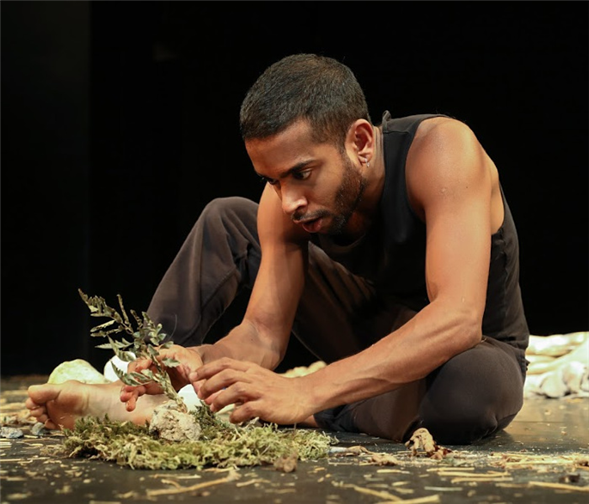Translate Page

Writer-director Peter Brook brings his latest play to Brooklyn
---
After more than 70 years in the theatre, writer-director Peter Brook continues to create new productions that challenge and mystify. His latest is The Prisoner, which is making its New York debut at Theatre for a New Audience in Brooklyn. Co-written and co-directed by Brook's longtime collaborator Marie-Hélène Estienne, this examination of imprisonment, the justice system and personal enlightenment focuses on a man (Hiran Abeysekera) mysteriously camped outside a jail.
These topics have long fascinated Brook, who won the 1966 Tony Award for Best Director for his staging of a play that touched on similar themes: The Persecution and Assassination of Marat as Performed by the Inmates of the Asylum of Charenton Under the Direction of the Marquis de Sade. While he worked with Laurence Oliver, John Gielgud, Paul Scofield, Glenda Jackson and other luminaries in his native England and on Broadway early on, the bulk of his career has been spent crafting theatre outside the mainstream spotlight with a multinational company of performers at his International Centre for Theatre Research in Paris. That's where he created the lauded three-part Hindu saga Mahabharata in 1985 and also where The Prisoner was born.
The play is inspired by an experience Brook had in the '70s while traveling in Afghanistan. He heard about a young man sitting on a hill facing a dilapidated prison and, curiosity piqued, sought him out. The man had been sentenced to remain there, without locks or bars, until he felt that he had atoned for an unnamed wrongdoing.
"It has haunted me for over 50 years," says Brook who, at 93, resembles a theatrical Yoda: a kindly face, soft-spoken voice and responses that have the centered calm of a wise master. "When I saw this man he looked at me and I saw a pair of eyes on fire. That look convinced me he was undergoing an immense transforming experience -- and a redeeming one. I never saw him again. I never found out what his crime was or what became of him. But what remains is this essential thing: that he accepted a tremendous punishment for whatever he had done."
In The Prisoner, which is set in an undefined country, the man's transgression is specified (murder), but the circumstances are morally complex. Brook spent many years grappling with how to tell the story. "We tried many different ways of approaching it," he says, including toying with turning it into a movie. But Brook felt the realism of cinema wasn't right for the ambiguous tale. "We needed the freedom of the theatre where you don't have to spell things out and can appeal directly to your imagination," he says.
{Image1}
As Brook developed the piece over many years, he collaborated with eclectic artists, including playwright Tarell Alvin McCraney (Head of Passes, The Brother/Sister Plays, Broadway's upcoming Choir Boy). The two met while McCraney was an undergrad at Chicago's DePaul University, and Brook even wrote him a recommendation letter when the dramatist applied to Yale School of Drama.
"When it came time to prepare The Prisoner, we needed to build it as a little team and we wanted Tarell to be part of it," Brook recalls. "You could call them workshops, but they were really little groups where we met, talked and got glimpses of things, and then we improvised on that. Tarell would watch or propose a theme, or I would propose something and he would participate as an actor -- usually marvelously. He is not on the bill, but he was part of the evolution of the form that we now have."
This has been Brook's unique creative process ever since he co-founded the International Centre for Theatre Research with the late Micheline Rozan back in 1970. (Although he stepped down from his leadership role in 2008, he continues to mount work there.) Even though he's frequently called a visionary, he's quick to share the praise. "People give me great credit for having the invention to do this or that, but no, we work and we come up against problems," he says of his collaborative theatre-making. "We've been working on The Prisoner for such a long time, which revealed the famous 'hunch,' a feeling that, yes, there was something there and, if we worked hard enough, patiently, that it would suddenly bring what we wanted."
While Brook talks eagerly and openly about how he makes shows, he refuses to discuss what they mean. "We don't explain things, we just leave it," he says, adding that he "rigorously avoids" any conventional approach where the issues of a play are presented or debated in one big scene. "Our role is to open something within you and not to imply a judgement," he says. "All we wish for is a quality of acting and a simplicity of staging that makes it clear we're not doing anything more than telling a story."
And yet The Prisoner seems like much more than that -- a parable perhaps, or a legend. If his earlier work, like the nine-hour Mahabharata, was epic poetry, is the 80-minute Prisoner his haiku? "Things gradually get purified and simplified down to the essence," he says. "People tell me that is what they feel in this and I am delighted."
Peter Brook will participate in post-show talkbacks after the 2pm performances on Saturday, December 8 and Sunday, December 9.
---
TDF MEMBERS: At press time, discount tickets were available for The Prisoner. Go here to browse our current offers.
Follow Frank Rizzo at @ShowRiz. Follow TDF at @TDFNYC.
Top image: Hiran Abeysekera in The Prisoner. Photos by Joan Marcus.